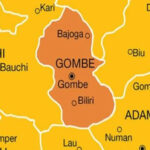On October 2020, our youths staged a nation-wide protest over police brutality, in particular, the excesses of members of the police unit called SARS. The protests ended badly. The federal government panicked and the security forces put pork marks on the tolerance quotient of the Buhari administration.
The first one year anniversary of the protests passed last Wednesday without a major incident although the police did not allow the youths to observe the day as they wished – with street marches. It was not without some good reasons. No one can ever guarantee that a protest that starts peacefully can end peacefully. Given the economic and security situation in the country, a poorly-managed public protest could be the tipping point. The police for once had a measured response to a matter of this nature.
The youths also made their point, daring the country to forget what motivated them to protest last year. It was all about how we are governed and how we are policed in contrast to how we wish to be governed and how we wish to be policed in a democracy. As I noted in my column for this newspaper of November 6, 2020: “It is neither foolish nor naïve to hope that through their protests, the youths might have chipped at the rock solid conscience of our well-heeled political leaders and forced them to recognise that their power comes from the people and the right of the people to own their power cannot ever be taken away from them – not through high-handedness and certainly not through police brutality.”
President Muhammadu Buhari appreciated the legitimacy of the youth protests. He too knew about the brutality of SARS personnel. He set up a panel “to investigate the human rights violations by SARS and recommend reform of the body” in 2018. He was also persuaded that some critical changes needed to be made in our policing system. In the wake of the protests, he scrapped SARS and replaced it with SWAT. He also promised police reforms.
But one year after the protests, there is a paucity of official information regarding the police reforms. We still do not know if SWAT is a change in name and not in the substance of the policing system. Nothing much is known about the implementation of the recommendations of the 2018 panel. Were the 37 former personnel of SARS cashiered out of the force? Were the 24 others prosecuted? What about the unravelling of 22 officers involved in the violation of the rights of Nigerian citizens; the payment of compensation in respect of 45 established complaints; the arrest and prosecution of two retired senior police officers; one for extra-judicial killing and the other for the illegal takeover of the property of a suspect?
We still do not know what form the police reforms have taken or are taking. What we see tells us nothing about a reformed policing system and the re-orientation of our police personnel. One year after, it should be possible for us to see in words and deeds government commitment to carrying out the reforms towards creating the police of the people for the people in the full service of the people. A major part of that would be to mend the broken trust between the police and the people. The people need to see the police not just as their friends, but more importantly as their protectors from, and defenders against, the criminal elements in our country.
No police or security force anywhere in the world can succeed without the support and the co-operation of the people. Mutual trust is the glue that holds them together. The government should take the reforms of the police seriously if it wants to rebuild the broken bridge between the people and this very important civil force. It would be nice for Buhari to initiate and monitor his promised reforms and correct course, where necessary, to ensure the reforms will achieve the desired results.
Whatever shape the reforms will take or are taking, they must not be allowed to fall into the template of routine and administrative actions that generate more smoke than fire and if, half-hearted executed, might push the service deeper into the lurch. We have gone past pious words and sonorous promises that are short in thought, planning and execution.
To move forward, if you would excuse a hackneyed phrase, the president’s reforms should take cognisance of certain facts and problems that, combined, have made the police the least trusted of our public institutions. It is important to note that the Nigeria Police is the weakest arm of our internal security system today. This stems from two points.
One is the gross under-funding of the service. The last time this country took adequate care in funding the police was during the Shagari administration in the Second Republic. The government provided the police with arms and equipment – armoured vehicles, fast moving vehicles – and motivated the police personnel to see themselves, not as the dregs of the society condemned to suffer on behalf of an unappreciative public, but the important first line of defence in our internal security system. Thus motivated, they went after the armed robbers without sparing a thought for the cost to themselves. The inspector-general of police at the time, the late Sunday Adewusi, is still remembered by officers and men of his generation as the best police chief we have had to date.
All that changed with the return of the generals in late 1983. One of their first acts was to disband the Mobile Police, nick-named kill-and-go. They confiscated the police vehicles and sold them cheaply to their close friends. No federal government has since then approached the threshold of those brief good days for the police. It would be nice to see that through Buhari’s reforms, the police would be properly funded, properly trained, properly re-oriented, properly equipped, and properly motivated to enable the service carry out the duties assigned to it by the constitution.
Two, we have progressively conflated the internal security role of the police and that of the military. Given this inadvisable conflation of roles, we do not see the best in either service. With the military presence in all the 36 states, the police see themselves as playing a subordinate role in our internal security system. The reforms should see to their de-coupling and restrict each service to its bounden duty.
The military is the ultimate line of our internal defence system. The deployment of its personnel to carry out the basic duties of the police, such as road blocks, takes something away from the protective shadow it casts over the country as our ultimate defence system. Its involvement in internal security should be done within the ambits of extant operational orders.
The roadblocks and checkpoints must go under the reforms. They are the visible faces of corruption in the force. Motorists have been killed at checkpoints by the police over demands for as little as five Naira. Ill-motivated and poorly catered for, police personnel often take their frustration out on the public. The welfare of our policemen and women is central to whatever police reforms are being implemented or contemplated by the president.

 Join Daily Trust WhatsApp Community For Quick Access To News and Happenings Around You.
Join Daily Trust WhatsApp Community For Quick Access To News and Happenings Around You.


